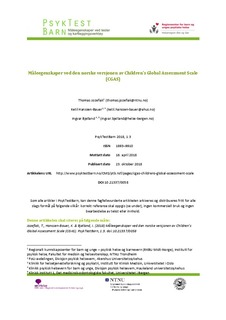Måleegenskaper ved den norske versjonen av Children’s Global Assessment Scale (CGAS)
Journal article, Peer reviewed
Published version

Åpne
Permanent lenke
http://hdl.handle.net/11250/2612317Utgivelsesdato
2018Metadata
Vis full innførselSamlinger
- Institutt for psykisk helse [1227]
- Publikasjoner fra CRIStin - NTNU [38049]
Sammendrag
The Children’s Global Assessment Scale (CGAS), was developed by David Shaffer and colleagues at Columbia University, in 1983. The CGAS was adapted from the Global Assessment Scale for adults (GAS), and is scored by clinicians as a measure of a child’s or adolescent’s psychosocial functioning during the month before assessment, on a scale from 1 (lowest functioning) to 100 (superior functioning in all areas). It is recommended for children and adolescents aged 4 to 16/17 years. The CGAS is scored by clinicians, and takes less than 10 minutes to complete. There is no information available whether the Norwegian CGAS was translated according to international procedures, and whether the translated version has been accepted by the original author. The Norwegian Directorate of eHealth states that the CGAS can be used in specialist health services in Norway. It is unknown whether there are additional copyright claims or competence requirements to score the instrument.
We included 34 Norwegian articles, of which 19 had more than 100 participants. Most of the participants were children and adolescents aged 6-18 years, but a few follow-up studies into adulthood were also included. The included studies varied considerably with regard to clinical samples, and there were both cross-sectional and longitudinal studies.
We found satisfactory evidence for convergent, discriminant, and predictive validity and interrater reliability, somewhat less for sensitivity to change. There was a lack of test-retest reliability studies.
We recommend the use of the Norwegian version both in research and clinical practice, provided that clinicians receive adequate training in scoring.